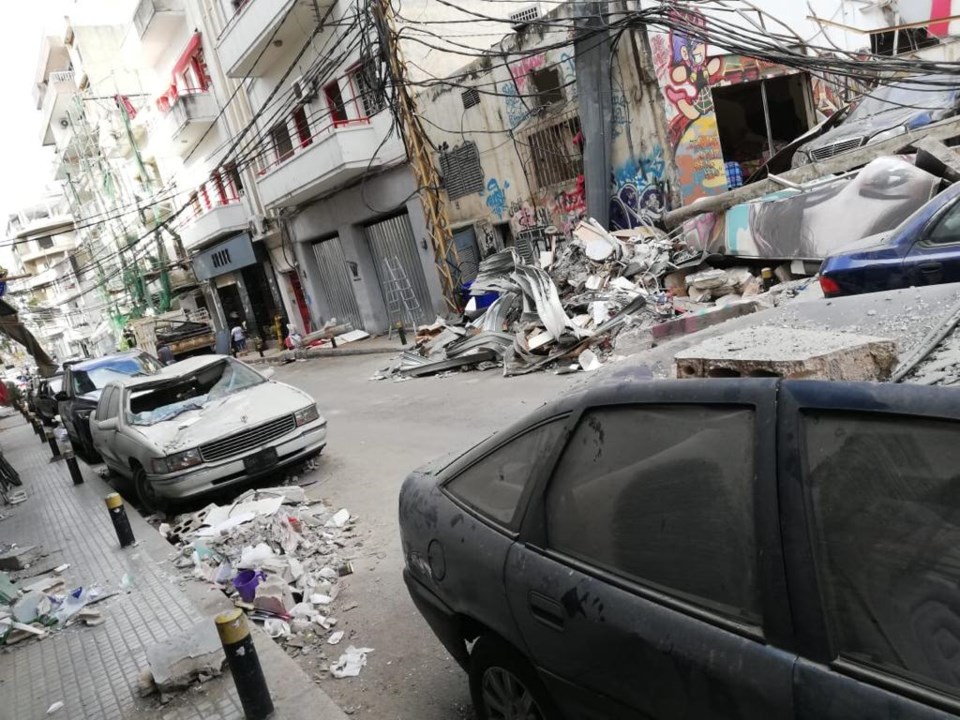A few days earlier, and George El Issa’s father would have been sitting on the balcony of his Beirut apartment, looking out over the port.
Samir El Issa would have seen what appeared, at first, to be a small fire, and he would have called to his wife, Mounira Kozma, to come out and see what was happening a scant few blocks away. They would have been standing there when the port exploded, in the Aug. 4 blast that has claimed the lives of a reported 200 people and injured at least 5,000 others.
A few days earlier, and George El Issa would have lost both his parents.
El Issa, safe in his Sapperton home, is still reeling from the images coming out of his native city. His old neighbourhood, Mar Mikhael, is the hardest-hit area of Beirut, right by the port.
It’s where he grew up. It’s where the family home is. It’s where his parents have stayed – until last week, when, by an act of timing that now seems nothing short of miraculous, El Issa was able to get them plane tickets and bring them to Canada.
“Probably by now they would be dead, if they were there,” El Issa says.
A NEW FUTURE
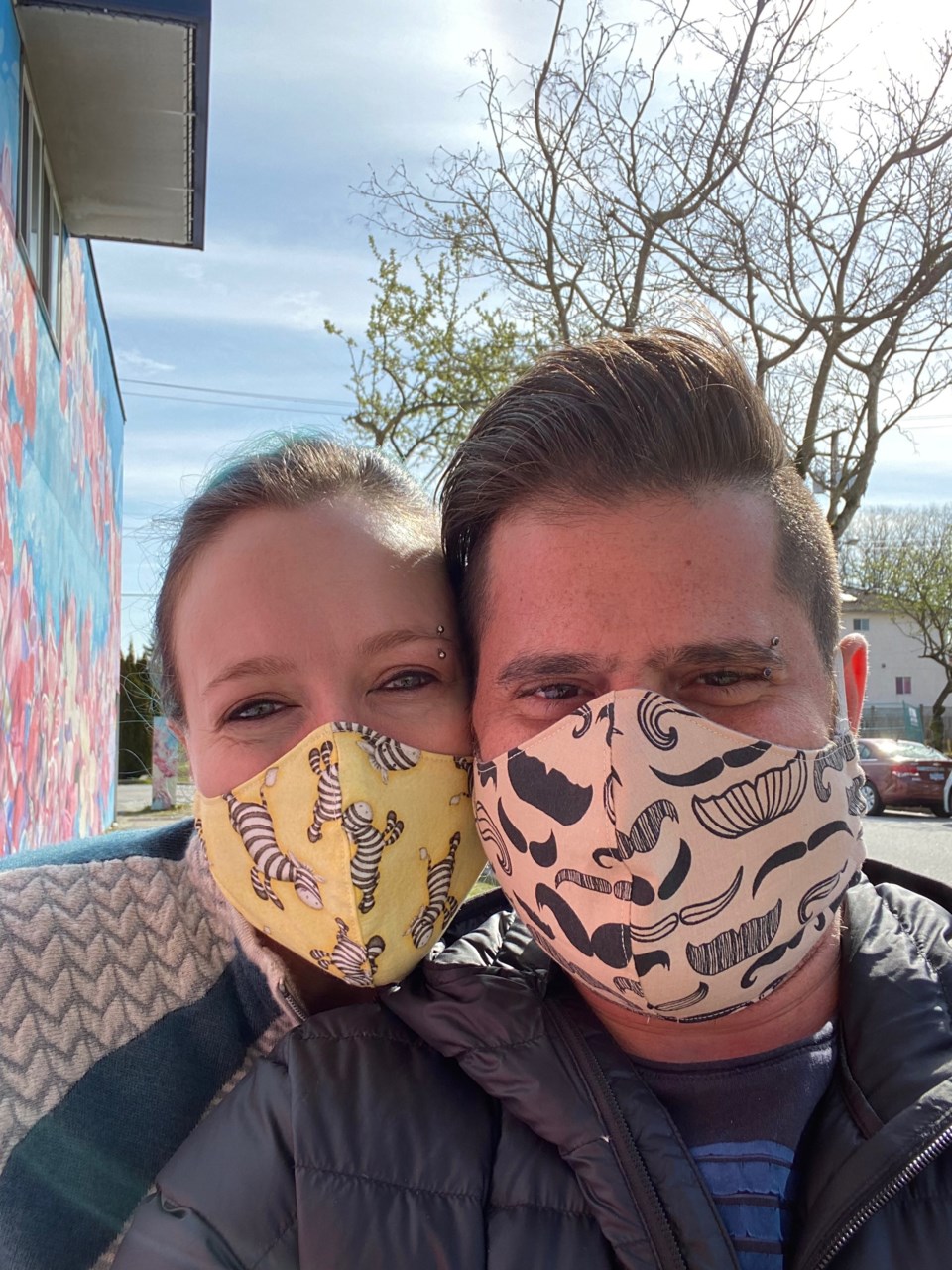
El Issa has lived in Canada for five-and-a-half years, first in Vancouver and then in Tsawwassen for a short time before moving to New Westminster two years ago.
He left Lebanon at the urging of his siblings – his brother in Vancouver and his sister in Ottawa.
“The situation in Lebanon is not good anymore,” he says. “Every day it’s getting worse and worse. We are only three siblings, and talking to my brother, he says, ‘Why don’t you come be by my side here?’ We are only the two brothers.”
His gratitude to be here is endless.
“I am so glad that I’m here,” he says. “I want to build my future. I don’t want to be in a country that every day there’s a new problem and you don’t have any future. You can’t build your future.”
He and his siblings had long been working to convince their parents to leave Lebanon in the face of growing political and economic unrest.
El Issa and his spouse, Kelly Shkuratoff, note that living conditions in Beirut have been getting worse and worse. Electricity was at first cut by small amounts, with planned blackouts at particular times of day; by the time of the explosion, residents were down to just a few hours of power a day. Banks are only letting people withdraw small sums of money. The cost of groceries has gone up exponentially. Medical care isn’t readily accessible – and even if you can find it, how can you afford it with no ability to access money?
Complicating everything is the fact that El Issa’s father recently had heart surgery. With a fifth-floor apartment and power outages meaning little to no elevator service, that left him virtually trapped in his own home.
Even so, the older couple didn’t want to leave. The two don’t speak English, so the thought of travel was daunting. Add in the COVID-19 pandemic, which brought international travel grinding to a virtual halt, and it seemed they might remain in Lebanon indefinitely.
“It’s their home. It’s where they live. It’s where their family lives,” Shkuratoff points out.
But when, at last, the two decided that life had deteriorated to the point that it was time to leave, they called El Issa and told him that yes, they would come to Canada. That decision was only possible, El Issa notes, because he and his siblings are Canadian citizens; because of that, they were able to get their parents a visitors’ visa.
El Issa and Shkuratoff were out of town when his parents’ phone call came, but they immediately jumped on the phone and online to do everything they needed to do. Book a plane ticket. Rent a basement suite for his parents to quarantine. Find furniture and household goods. Stock the suite with everything his parents would need to live out their two weeks in isolation.
It was a mad scramble, Shkuratoff notes, but it all worked out.
The suite they found was just around the corner from their own home. And El Issa’s parents – armed with a letter in English from their children saying, essentially, “I don’t speak English, so please help me get to Canada” – were able to make the 20-hour journey via Germany to Vancouver.
They wore gloves and masks the whole way. They arrived, exhausted but safe, and moved into their new home to quarantine.
Three days later, Beirut exploded.
A WORLD AWAY
El Issa was on the phone with his father. Samir El Issa was in his suite, watching Lebanese television, and mentioned to his son that they’d shown a “little fire” in the port.
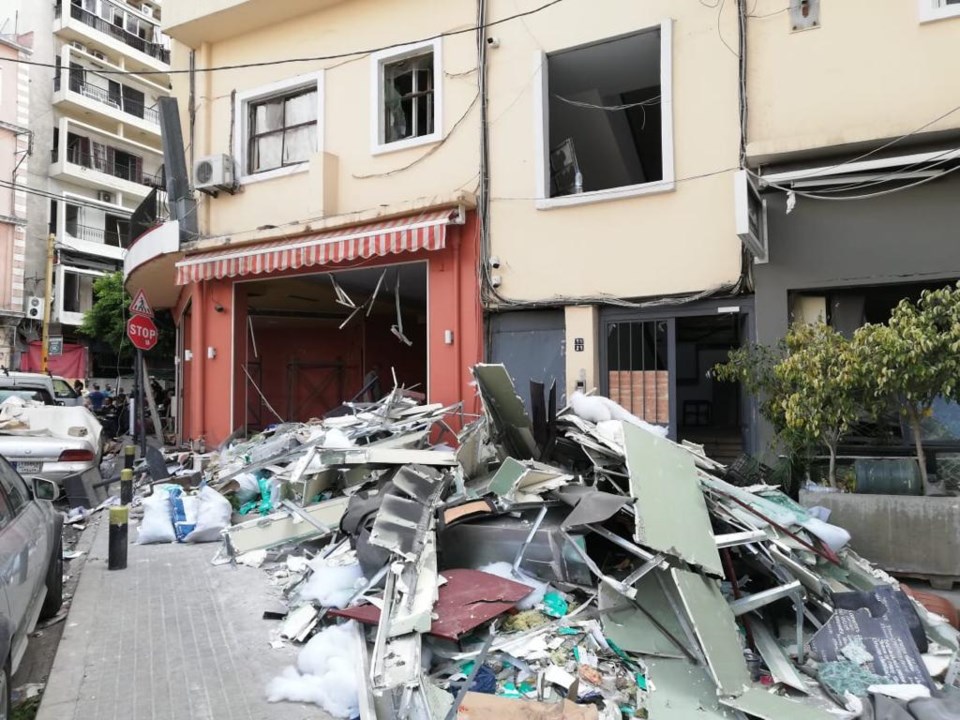
Interested in what was happening in his old neighbourhood, El Issa went onto his laptop and searched out the news. Within 10 minutes, the gigantic explosion happened – and father and son watched in horror as their neighbourhood fell apart, in real time, halfway around the world.
It was already evening by then, and, with no power in Beirut, there was no way to get news from their remaining family and friends in the city. There was no way to see images of their own home and what had happened to it.
It was two days before an old friend was able to get into the neighbourhood. What would have been a five-minute drive from a nearby area took him the better part of three hours, El Issa notes, but he was finally able to get in and take photos to send to them. They’ve now seen the damage for themselves. The balcony – that place where his father sat every evening and looked over the port – was gone. The windows and doors were blown out.
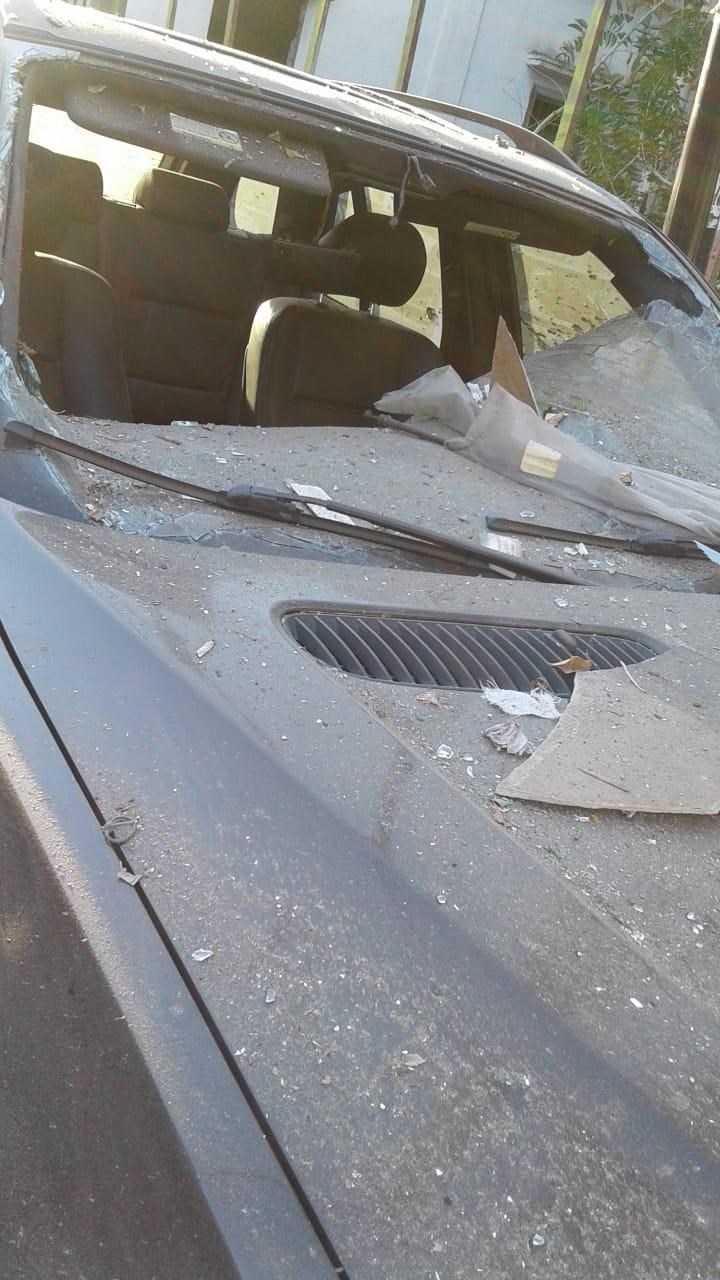
“Our house is blown up, and the cars, they are blown up on the street,” El Issa says. “They have no home to go back to.”
They’ve heard news from family, too.
El Issa’s uncle and his family have been sleeping on the street, by candlelight, outside their own home to prevent looting – with windows blown out across an enormous swath of the city, looting has been a widespread problem.
El Issa also discovered he lost two close childhood friends in the blast.
Safe in Canada, El Issa and Shkuratoff have remained glued to the news, trying to stay on top of each day’s new headlines.
It’s been surreal for El Issa to watch the scenes of devastation in the streets that are so familiar to him.
“You see the street where you play all your life. You ride your bicycles there with your friends. … And now there’s nothing left. There’s really nothing left,” he says.
He has spotted his neighbours, his cousins, in television news coverage.
“You see your friends; they’re on the news; they’re crying; there’s blood on them,” he says. “It hurts.”
WHAT’S NEXT
El Issa aches to go back and help. But he can’t.
Now he and his parents have to decide what to do with the family home. Like countless homes across Beirut, it needs enormous repair work. But how do you arrange new windows in a city where thousands of windows have been blown out and where few have the money to make repairs anyway? How do you assess your losses and figure out a rebuilding plan from the other side of the world?
It’s been devastating for El Issa, and especially for his parents.
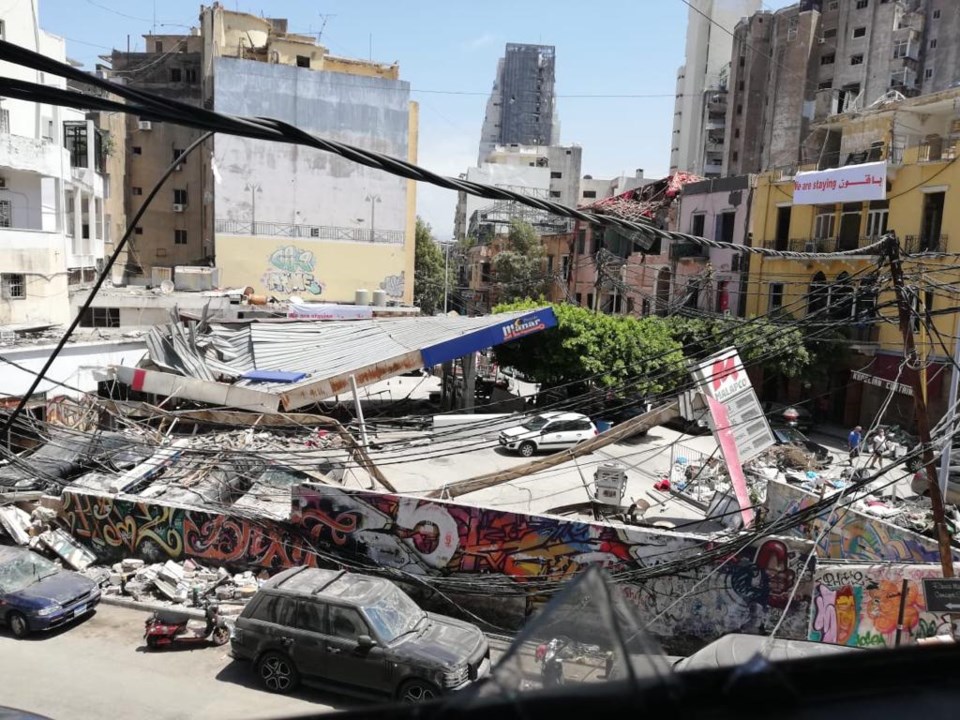
“After what’s happened in Lebanon now, they’re stressed and they don’t know what to do. They lost their house, and they lost everything there. … They don’t know what to do now.”
With time already ticking on his parents’ six-month visitors’ visa, El Issa already has the wheels in motion to try to keep them in Canada permanently. He had intended to pursue immigration channels through the federal government’s family sponsorship program, but, he notes, that opportunity never opened this year because of the COVID-19 pandemic.
He’s hoping Ottawa will extend refugee status to people from Lebanon so his parents can stay. In the meantime, he has contacted an immigration lawyer to see what can be done.
“I don’t want them to go back to Lebanon,” he says firmly.
El-Issa’s own future plans were temporarily sidelined by the chaos. A hairdresser by trade, he’s been pursuing renovations to turn the lower level of his home into a home-based salon, with all the corresponding permits and licensing required by city and health officials.
Now he’s turning his attention back to those plans as he, his parents and Shkuratoff count down the days of his parents’ quarantine. So far, there have been no reported cases of COVID-19 associated with his parents’ flights. (Eleven days into quarantine, when El Issa spoke to the Record Monday, neither had shown any symptoms.)
Tomorrow (Thursday, Aug. 13) marks the final day of quarantine.
And then? Samir El Issa and Mounira Kozma can come out of their basement suite. They can walk to their son’s house. And they can have a barbecue to mark what they all hope will be the beginning of a new life.
In Canada. In New Westminster.
It won’t be the home they’ve known for so long. But it will be safe. And there will be family.
HOW YOU CAN HELP
Anyone wanting to helpin the aftermath of the Beirut explosion can donate to the Lebanese Red Cross at https://supportlrc.app/donate/
George El Issa is also willing to help coordinate donations from interested community members. He invites anyone with questions to reach him at [email protected].
